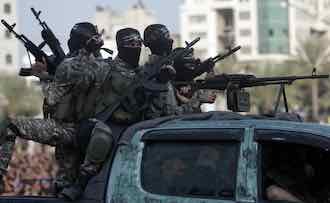
By Joseph A. Klein, CFP United Nations Columnist —— Bio and Archives July 13, 2017
Comments | Print This | Subscribe | Email Us
 The United Nations has just issued a report entitled “GAZA TEN YEARS LATER - United Nations Country Team in the occupied Palestinian.” It was written from the false perspective that Gaza is still part of the so-called Palestinian territory “occupied” by Israel, which represents the official position of the United Nations as a whole. However, the report also contains some insights into the destructive pattern of conduct by the Palestinian leadership, contributing significantly to the misery of the people of Gaza.
If Israel were truly the “occupier” of Gaza, 12 years after its unilateral withdrawal and 10 years after Hamas’s violent takeover of Gaza from Palestinian Authority control, Hamas would not be ruling Gaza, let alone remaining free to use the territory as a launching pad for terrorist attacks against Israel. Indeed, the UN report itself demonstrated some cognitive dissonance on the question regarding who actually runs Gaza. In one breath the report asserted that Israel is the occupying power in Gaza because of “the control that Israel retained on Gaza’s air space, sea space and external borders continuously.” However, the report also noted the “exercise of government-like functions and territorial control” by the “de facto authorities in Gaza” – i.e., Hamas. The report described how “Hamas has increasingly tightened its grip on power” since seizing control and “was able to sustain its de facto authority and build up its military strength.”
The United Nations has just issued a report entitled “GAZA TEN YEARS LATER - United Nations Country Team in the occupied Palestinian.” It was written from the false perspective that Gaza is still part of the so-called Palestinian territory “occupied” by Israel, which represents the official position of the United Nations as a whole. However, the report also contains some insights into the destructive pattern of conduct by the Palestinian leadership, contributing significantly to the misery of the people of Gaza.
If Israel were truly the “occupier” of Gaza, 12 years after its unilateral withdrawal and 10 years after Hamas’s violent takeover of Gaza from Palestinian Authority control, Hamas would not be ruling Gaza, let alone remaining free to use the territory as a launching pad for terrorist attacks against Israel. Indeed, the UN report itself demonstrated some cognitive dissonance on the question regarding who actually runs Gaza. In one breath the report asserted that Israel is the occupying power in Gaza because of “the control that Israel retained on Gaza’s air space, sea space and external borders continuously.” However, the report also noted the “exercise of government-like functions and territorial control” by the “de facto authorities in Gaza” – i.e., Hamas. The report described how “Hamas has increasingly tightened its grip on power” since seizing control and “was able to sustain its de facto authority and build up its military strength.” “The Hamas takeover of Gaza has had a significant impact on the legislative, judicial and executive branches. The fact that no presidential or legislative elections have been held in Palestine since 2006 has also created a democratic deficit that undermines the legitimacy of state institutions and their actions on both sides of the divide… The division has resulted in the establishment of two different lawmaking processes and the enactment of diverging laws in Gaza and the West Bank, further eroding the unity and coherence of the future state of Palestine.”There is no harmonization of the legal frameworks applied by Hamas and the Palestinian Authority respectively within areas under their control, due to the division of basic government authority between Hamas and the Palestinian Authority. The result is “the establishment of a parallel justice system in the Gaza Strip,” according to the UN report. “In addition,” the report concluded, “the lack of a harmonized legal framework and judiciary has at times created situations whereby courts in the West Bank have refused to implement verdicts issued by Gaza courts and vice versa, to the great detriment of the individuals and families involved.” Moreover, the UN report found that the division of authority has “caused a split of the Palestinian civil service, impacting the delivery of basic services such as education and health care.”
“The Hamas coup in Gaza in June 2007 and the administrative division that followed between the PA and Hamas has had a significant impact on administration and public services in Gaza...Ten years later, the Palestinian divide shows no sign of narrowing. The divisiveness and mistrust between Fatah and Hamas poses significant challenges to the development of the Strip.”To be sure, the UN Gaza report sharply criticized Israel for contributing to the dire conditions in Gaza. It said that Israel’s “restrictions on the access and movement of people and goods, ultimately amounting to a blockade by sea, air and land” violated international law. The report accused Israel of carrying out a blockade that “constitutes a form of collective punishment on the civilian population in Gaza contrary to Article 33 of the Fourth Geneva Convention, applicable to the occupied Territory.” Aside from the fact that Israel no longer “occupies” Gaza, as discussed earlier, Israel’s self-defense measures in the face of Hamas’s rocket and terror tunnel attacks from Gaza are in accord with international law. Indeed, the UN report itself referred to what it described as;
“...the military build-up in Gaza by Hamas and other militant groups, which continued and intensified over the past decade, including the development, stockpiling and firing of rockets capable of reaching deep into Israel and the construction of sophisticated tunnels used for kidnappings and terrorist attacks in Israel.” The UN report documented how Israel’s restrictions on movements of people and goods into and out of Gaza increased only after “significant military escalation and rocket attacks by Hamas and other armed groups on Israel.”Moreover, Israel has not imposed anything near what could be considered a complete blockade. Far from it, Israel has taken substantial national security risks in allowing into Gaza all manner of humanitarian aid and commercial products. Exports out of Gaza have also been liberalized. As usual, the UN report on Gaza was unfairly critical of Israel. That’s known as “a dog biting a man” story. However, the fact that this UN report finally sheds some light specifically on the responsibility the Palestinian leaders themselves bear for the present plight of the people living in Gaza is “a man bites dog” story as far as the UN is concerned.
Joseph A. Klein is the author of Global Deception: The UN’s Stealth Assault on America’s Freedom.